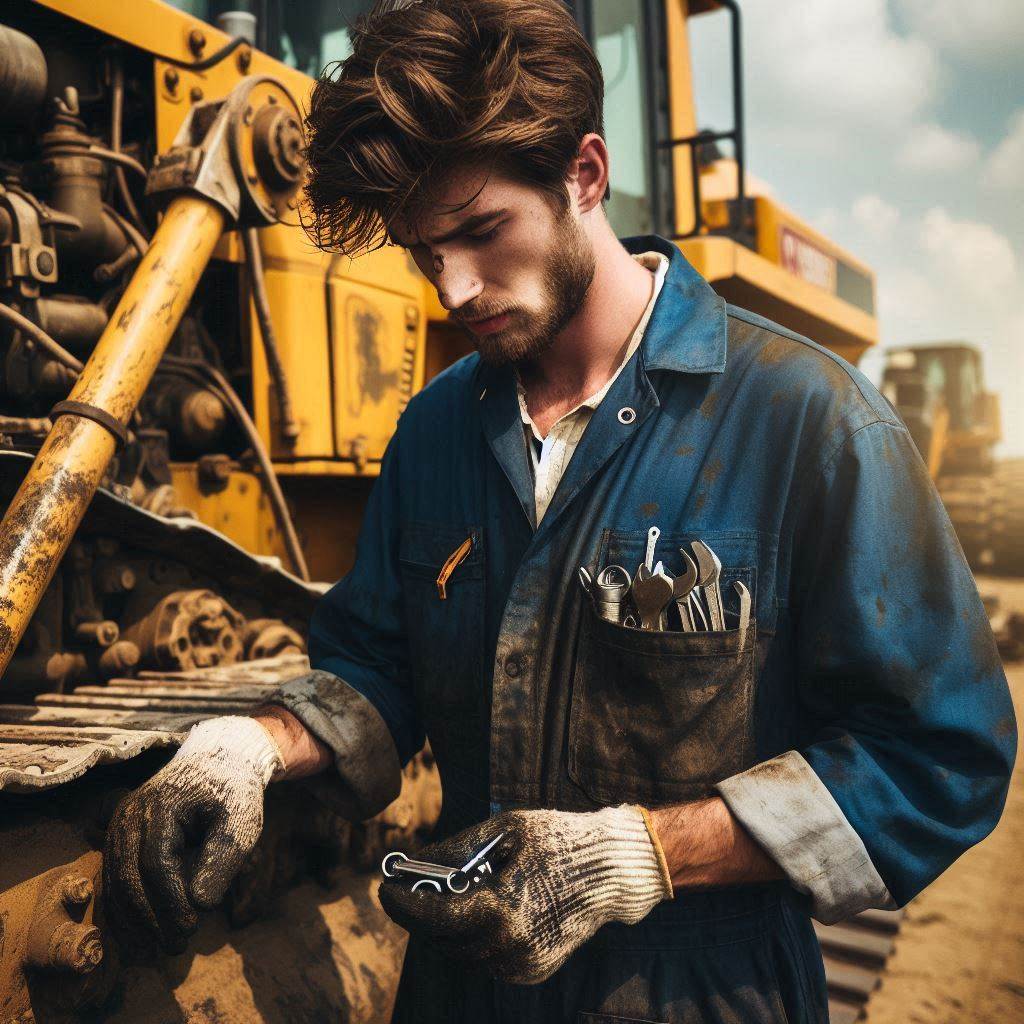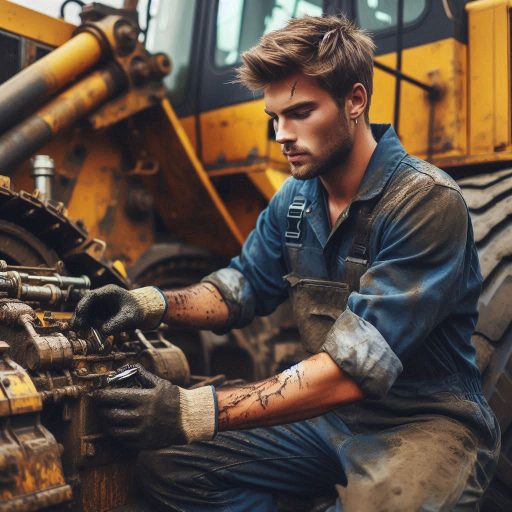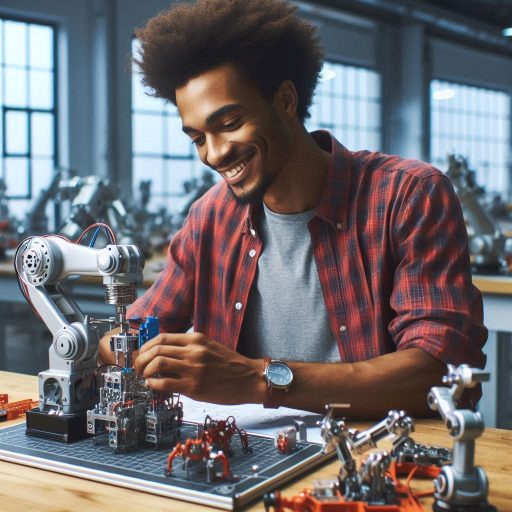Introduction
Overview of the Role of Industrial Machinery Mechanics
Industrial machinery mechanics play a pivotal role in the manufacturing and production sector as Industrial Machinery Mechanics Work Environments.
They are responsible for installing, maintaining, and repairing complex machinery that keeps production lines running smoothly.
Their tasks include diagnosing equipment failures, performing preventive maintenance, and making necessary repairs to ensure machinery operates efficiently.
Their expertise helps prevent downtime and ensures that equipment performs at its best, which is critical for maintaining productivity and quality in industrial operations.
Importance of Work Environments in Ensuring the Safety and Efficiency of Mechanics
A well-designed work environment is essential for the safety and efficiency of industrial machinery mechanics.
Proper lighting, ample space, and organized tool storage reduce the risk of accidents and improve workflow.
A clutter-free, well-maintained workspace allows mechanics to work more effectively and confidently.
Safety protocols and clear communication further enhance this environment, ensuring that potential hazards are managed and tasks are performed correctly.
By prioritizing these elements, employers can create a supportive atmosphere that boosts both mechanic performance and overall operational success.
Investing in a safe, efficient work environment is crucial for optimizing the capabilities of machinery and the well-being of those who maintain it.
Types of Work Environments for Industrial Machinery Mechanics
Industrial machinery mechanics operate in various environments, each with distinct characteristics and demands.
Understanding these settings helps them adapt and excel in their roles.
The four main work environments include manufacturing plants, construction sites, power generation facilities, and maintenance shops.
Manufacturing Plants
In manufacturing plants, mechanics play a critical role in maintaining and repairing machinery that keeps production lines moving.
These facilities are often filled with complex systems, such as conveyor belts and robotic arms.
The environment is typically well-lit but noisy, with high production demands.
Mechanics work to prevent downtime and ensure smooth operations.
Precision and attention to detail are essential to keep machinery functioning efficiently and to support the overall manufacturing process.
Construction Sites
Construction sites present a different set of challenges for industrial machinery mechanics.
Here, they deal with heavy machinery essential for building projects, including bulldozers, cranes, and excavators.
The work is often performed outdoors, exposing mechanics to varying weather conditions and rugged terrain.
They must quickly adapt to changing environments and troubleshoot issues on-site.
Safety is paramount due to the dynamic nature of construction work, and mechanics must coordinate closely with other construction professionals to avoid delays and ensure project progress.
Power Generation Facilities
Power generation facilities require mechanics to work with heavy equipment such as turbines and generators.
These facilities might be fossil fuel-based or use renewable energy sources.
The environment is usually controlled to maintain optimal operating conditions.
Mechanics in these settings handle high-voltage systems and must follow strict safety protocols.
Regular maintenance and emergency repairs are critical to ensuring a continuous power supply.
Technical expertise and precision are vital to managing the complex machinery and ensuring reliable operation.
Maintenance Shops
Maintenance shops offer a more controlled work environment compared to the other settings.
Here, mechanics focus on repairing and servicing various types of machinery within a workshop.
This environment provides access to necessary tools and parts, allowing for detailed inspections and repairs.
Mechanics work on everything from small engines to large industrial machines.
The controlled setting reduces the chaos and unpredictability found in other environments, enabling thorough and efficient maintenance work.
Each work environment requires industrial machinery mechanics to adapt their skills and approach.
From the bustling manufacturing plant to the unpredictable construction site, the high-stakes power generation facility, or the controlled maintenance shop, their expertise ensures machinery operates smoothly and efficiently.
Understanding these environments helps mechanics prepare for the diverse challenges they may face in their roles.
Read: Online Courses for Surveying and Mapping Technicians
Safety Regulations and Protocols
Safety regulations and protocols are crucial for industrial machinery mechanics.
These guidelines ensure a safe working environment, protect workers from hazards, and maintain operational efficiency.
Adhering to safety standards is essential in preventing accidents and ensuring a safe workplace.
Importance of Following Safety Guidelines in Industrial Settings
Following safety guidelines in industrial settings is vital for protecting both workers and equipment.
Machinery can pose significant risks if not handled correctly.
Adhering to safety protocols helps prevent accidents such as falls, electrical shocks, and machinery malfunctions.
Guidelines are designed to minimize risks and address potential hazards before they become problems.
Consistent compliance with these rules reduces workplace injuries and enhances overall safety.
It also fosters a culture of safety and responsibility among workers.
Training Programs for Mechanics to Prevent Accidents
Training programs are essential for industrial machinery mechanics to prevent accidents and ensure proper safety practices.
These programs cover various aspects, including machinery operation, emergency response, and safety procedures.
Mechanics learn to handle equipment safely and effectively through hands-on training and simulations.
Regular refresher courses keep skills updated and address new safety regulations.
Effective training helps mechanics recognize potential hazards and respond appropriately.
By understanding and applying safety protocols, mechanics contribute to a safer work environment and reduce the likelihood of accidents.
Required Safety Gear and Equipment for Different Work Environments
Different work environments require specific safety gear and equipment to protect mechanics.
In manufacturing plants, ear protection, safety glasses, and gloves are often necessary due to high noise levels and moving parts.
Construction sites demand robust safety gear, including hard hats, steel-toed boots, and high-visibility vests, to protect against falling objects and uneven terrain.
Power generation facilities require additional protective equipment such as insulated gloves and face shields to handle high-voltage systems safely.
Maintenance shops generally need less specialized gear but still require safety glasses, gloves, and appropriate clothing to prevent injuries from tools and machinery.
Each environment has its unique hazards and requires tailored safety equipment.
Mechanics must be aware of and use the appropriate gear for their specific work setting.
Proper safety equipment not only protects mechanics from injuries but also ensures they can perform their duties effectively and efficiently.
Essentially, adhering to safety regulations, participating in comprehensive training programs, and using the right safety gear are fundamental practices for industrial machinery mechanics.
These protocols help create a safer work environment, prevent accidents, and ensure that mechanics can perform their jobs with confidence and competence.
Read: Surveying and Mapping Technician: Job Satisfaction
Physical Demands of the Job
Industrial machinery mechanics face various physical demands that require strength, endurance, and adaptability.
The nature of their work involves handling heavy machinery, working in challenging environments, and dealing with potential hazards.
Understanding these physical demands helps mechanics prepare for the job and maintain their health and safety.
Lifting Heavy Machinery Parts
One of the primary physical demands of the job is lifting heavy machinery parts.
Mechanics often handle components like engines, gears, and large tools that can be extremely weighty.
This requires significant physical strength and proper lifting techniques to avoid injury.
Mechanics need to use their entire body effectively, employing techniques such as bending at the knees and keeping their back straight.
Regular physical conditioning and strength training can help mechanics manage these heavy loads and reduce the risk of musculoskeletal injuries.
Working in Confined Spaces
Mechanics frequently work in confined spaces, which presents its own set of physical challenges.
These spaces may include machinery compartments or tight areas under equipment.
Working in confined spaces requires agility and flexibility, as well as the ability to maneuver in restricted areas.
Mechanics must often adopt awkward positions and work in limited visibility.
Proper training and the use of specialized tools are essential to safely perform tasks in these environments.
Techniques such as stretching and maintaining good physical fitness can help mechanics handle the physical strain of confined workspaces.
Exposure to Loud Noises and Vibrations
Exposure to loud noises and vibrations is another significant physical demand.
Industrial machinery often generates high noise levels and vibrations that can affect a mechanic‘s health.
Prolonged exposure to loud noises can lead to hearing loss, while constant vibrations can cause discomfort and long-term health issues.
To mitigate these risks, mechanics must use appropriate hearing protection, such as earplugs or earmuffs, and anti-vibration gloves.
Regular hearing check-ups and monitoring vibration exposure are important for maintaining health and preventing hearing and musculoskeletal problems.
Potential Hazards Such as Electrical Shocks or Burns
Mechanics also face potential hazards like electrical shocks and burns.
Working with electrical systems and hot machinery components increases the risk of these injuries.
Proper training in handling electrical equipment and understanding safety protocols are essential to prevent accidents.
Mechanics must use insulated tools and wear protective clothing to guard against electrical shocks.
Additionally, they need to be cautious around hot surfaces and components to avoid burns.
Awareness and adherence to safety procedures help minimize these risks and protect mechanics from serious injuries.
The physical demands of being an industrial machinery mechanic are diverse and challenging.
Lifting heavy parts, working in confined spaces, enduring loud noises and vibrations, and dealing with potential hazards require strength, agility, and careful attention to safety.
By understanding these demands and employing proper techniques and safety measures, mechanics can effectively manage the physical aspects of their job and maintain their overall well-being.
Read: Importance of Accuracy in Surveying and Mapping

Tools and Equipment Used
Industrial machinery mechanics rely on a range of tools and equipment to perform their duties effectively.
The variety of tools required depends on the type of machinery being serviced and the specific tasks involved.
Proper maintenance and calibration of these tools are crucial for ensuring accuracy and safety.
Transform Your Career Today
Unlock a personalized career strategy that drives real results. Get tailored advice and a roadmap designed just for you.
Start NowCommon Tools Used by Industrial Machinery Mechanics
Mechanics use a broad array of common tools to handle everyday tasks.
Essential tools include wrenches, screwdrivers, pliers, and hammers.
Socket sets and adjustable wrenches are vital for loosening and tightening bolts and nuts.
Multimeters and test lights are used to diagnose electrical issues and ensure proper functioning of circuits.
Power tools like drills and impact drivers help in tasks requiring greater efficiency and precision.
Each tool plays a crucial role in performing repairs and maintenance tasks accurately and efficiently.
Specialized Equipment for Specific Types of Machinery
In addition to common tools, mechanics use specialized equipment tailored to specific machinery.
For example, alignment tools and balancing equipment are used for precision tasks involving rotating machinery.
Hydraulic jacks and cranes are essential for lifting and maneuvering heavy parts safely.
For complex machinery, such as CNC machines or turbines, specialized diagnostic tools and calibration equipment are necessary.
This specialized equipment ensures that repairs and adjustments are made accurately, helping maintain the machinery‘s performance and longevity.
Importance of Proper Maintenance and Calibration of Tools
Maintaining and calibrating tools is crucial for their effective operation and longevity.
Regular maintenance ensures that tools remain in good working condition and can perform their intended functions reliably.
For example, lubricating moving parts, cleaning tools after use, and checking for wear and tear are essential practices.
Calibration is particularly important for tools that measure or adjust machinery settings.
Accurate calibration ensures that tools provide precise measurements and adjustments, which is critical for the proper functioning of machinery.
Neglecting maintenance and calibration can lead to inaccurate work, potential machinery damage, and increased safety risks.
Essentially, industrial machinery mechanics depend on a diverse set of tools and equipment to carry out their responsibilities.
From common hand tools to specialized machinery, each plays a vital role in maintaining and repairing equipment.
Proper maintenance and regular calibration of these tools are essential to ensure their accuracy and effectiveness.
By keeping tools in top condition, mechanics can perform their tasks efficiently and uphold safety and performance standards in their work.
Read: Field vs. Office Work in Surveying and Mapping
Teamwork and Communication
Effective teamwork and communication are vital for industrial machinery mechanics.
Collaborating with others and conveying information clearly ensures smooth operations and enhances safety.
Here‘s how teamwork and communication impact the role of a mechanic.
Collaborating with Other Mechanics and Engineers
Mechanics often work closely with other mechanics and engineers to address complex issues and complete projects efficiently.
Collaboration involves sharing insights, troubleshooting problems together, and coordinating tasks.
For example, when working on a major machinery overhaul, mechanics might team up with engineers to understand technical specifications and repair requirements.
This collaborative approach leverages diverse expertise, leading to more effective problem-solving and innovative solutions.
Teamwork also ensures that tasks are completed more quickly and accurately, as responsibilities are shared and managed collectively.
Communicating Effectively with Supervisors and Colleagues
Effective communication with supervisors and colleagues is crucial for successful operations.
Mechanics need to report on progress, highlight issues, and seek guidance as needed.
Clear communication with supervisors ensures that work aligns with organizational goals and safety standards.
Regular updates and discussions help supervisors provide necessary support and make informed decisions.
Additionally, communicating clearly with colleagues fosters a collaborative work environment, allowing for efficient problem resolution and coordination of efforts.
Importance of Clear and Concise Communication in Preventing Accidents
Clear and concise communication is essential for preventing accidents in industrial settings.
Misunderstandings or vague instructions can lead to mistakes, equipment malfunctions, and safety hazards.
For instance, if a mechanic does not clearly communicate the status of a repair, others might unknowingly interact with machinery that is not yet fully operational.
Effective communication includes using precise language, confirming understanding, and providing detailed instructions or updates.
By ensuring that everyone involved is on the same page, mechanics can prevent accidents and maintain a safe working environment.
In summary, teamwork and communication are integral to the role of an industrial machinery mechanic.
Collaborating with other mechanics and engineers enhances problem-solving and efficiency, while effective communication with supervisors and colleagues ensures alignment with organizational goals.
Clear and concise communication is crucial for preventing accidents and maintaining safety.
By prioritizing these aspects, mechanics contribute to a more productive and secure work environment.
You Might Also Like: Career Pathways in Marine Engineering Explained
Environmental Factors
Environmental factors play a significant role in the daily work of industrial machinery mechanics.
From extreme temperatures to exposure to chemicals, these conditions can affect both the mechanics’ safety and the performance of the machinery they maintain.
Understanding and adapting to these factors is essential for effective and safe operations.
Working in Extreme Temperatures
Mechanics often work in environments with extreme temperatures, whether it’s the intense heat of a furnace room or the cold of an outdoor site during winter.
Extreme temperatures can impact both the mechanics’ comfort and their efficiency.
High temperatures may lead to heat stress and dehydration, while low temperatures can cause tools and machinery components to become brittle.
Mechanics need to wear appropriate clothing and take frequent breaks to manage these conditions.
Ensuring that machinery is well-maintained and operates within its temperature range helps prevent overheating or freezing issues.
Exposure to Chemicals and Fumes
Exposure to chemicals and fumes is another common environmental factor.
Mechanics may work with lubricants, solvents, and other hazardous substances that can emit harmful fumes.
Proper ventilation, personal protective equipment (PPE), and safety procedures are essential to minimize exposure.
Mechanics should use masks, gloves, and eye protection to safeguard against chemical splashes and inhalation of fumes.
Regular training on handling hazardous materials and emergency response ensures safety when dealing with chemicals and prevents long-term health issues.
Weather Conditions Affecting Outdoor Work Environments
Weather conditions significantly affect outdoor work environments.
Rain, snow, and high winds can pose safety risks and impact the performance of machinery.
For instance, working on wet or icy surfaces increases the risk of slips and falls.
Mechanics must be prepared to adapt to changing weather conditions by wearing suitable protective gear and using equipment that can handle varying conditions.
Additionally, weather can affect machinery performance, causing delays or requiring adjustments to maintenance schedules based on environmental factors.
Impact of Environmental Factors on Machinery Performance
Environmental factors also impact machinery performance.
Extreme temperatures can affect the efficiency and longevity of equipment.
High heat may cause overheating, while cold temperatures can lead to sluggish operation or damage.
Chemicals and fumes can corrode components or lead to premature wear.
Weather conditions such as rain or dust can introduce contaminants that affect machinery functionality.
Regular inspections and maintenance are crucial to ensure that machinery operates optimally despite these environmental challenges.
Adjusting maintenance practices and using weather-resistant components help mitigate these impacts and maintain performance.
Environmental factors such as extreme temperatures, exposure to chemicals, and adverse weather conditions play a significant role in the work of industrial machinery mechanics.
Adapting to these conditions through proper PPE, safety protocols, and regular maintenance ensures both personal safety and optimal machinery performance.
By understanding and addressing these environmental factors, mechanics can enhance their effectiveness and contribute to a safer and more efficient work environment.
Technological Advancements
Technological advancements are reshaping the field of industrial machinery mechanics, offering new tools and techniques that enhance efficiency and precision.
Staying abreast of these changes is essential for mechanics to remain effective in their roles.
Here‘s how technology is impacting the industry.
Use of Advanced Machinery Diagnostics and Repair Tools
Advanced machinery diagnostics and repair tools are revolutionizing the way mechanics approach their work.
Modern diagnostic tools, such as computerized diagnostic systems and sensors, provide real-time data on machinery performance.
These tools help identify problems quickly and accurately, allowing for more efficient repairs.
Advanced software can analyze data to predict potential failures before they occur.
This proactive approach minimizes downtime and extends the lifespan of equipment.
Mechanics use these tools to enhance their diagnostic capabilities, leading to more precise and timely maintenance interventions.
Training Programs for Mechanics to Keep Up with New Technologies
As technology evolves, ongoing training programs are crucial for mechanics to stay current.
These programs cover the latest diagnostic tools, repair techniques, and software updates.
Mechanics learn how to use new equipment and interpret data from advanced diagnostic systems.
Training may include hands-on workshops, online courses, and manufacturer-specific certification programs.
Keeping skills up-to-date ensures that mechanics can effectively work with new technologies and maintain their competency in a rapidly changing field.
Regular training also helps mechanics adapt to new tools and methodologies, enhancing their overall efficiency and effectiveness.
Integration of Automation and Robotics in Industrial Settings
The integration of automation and robotics in industrial settings is transforming the industry.
Automated systems and robotic arms now handle tasks previously performed manually, such as assembly, welding, and material handling.
Mechanics work alongside these advanced systems, performing maintenance and troubleshooting as needed.
Automation increases production speed and consistency, while robotics improve precision and reduce human error.
Mechanics must adapt to working with these technologies, understanding their operation and maintaining their functionality.
The rise of automation and robotics requires mechanics to develop skills in managing and servicing these sophisticated systems.
Potential Impact of Technology on the Future of Industrial Machinery Mechanics
Technology is set to significantly impact the future of industrial machinery mechanics.
The advancement of AI and machine learning could lead to more predictive maintenance and automated diagnostics.
Mechanics may increasingly work with augmented reality (AR) and virtual reality (VR) for training and remote assistance.
These technologies could enhance troubleshooting processes and improve repair accuracy.
Additionally, the growth of smart factories and interconnected devices will require mechanics to manage and integrate complex systems.
As technology continues to evolve, mechanics will need to embrace new tools and approaches, continually adapting their skills to meet the demands of an increasingly automated and data-driven industry.
Technological advancements are profoundly influencing the role of industrial machinery mechanics.
The use of advanced diagnostics, the need for ongoing training, the integration of automation and robotics, and the potential impact of future technologies are all shaping the industry.
Embracing these changes and staying updated with the latest developments will ensure that mechanics remain effective and relevant in their field, driving innovation and efficiency in industrial settings.
Showcase Your Business Today
Reach thousands of readers actively exploring professional services. Publish your business profile and grow your audience now.
Publish NowFind Out More: Funding Opportunities for Environmental Engineering Projects
Conclusion
The Importance of Work Environments for Industrial Machinery Mechanics
Work environments for industrial machinery mechanics are pivotal to their performance and safety.
A well-structured and organized workspace enhances efficiency and reduces the likelihood of accidents.
When the environment supports smooth operations, mechanics can perform their tasks with greater precision and confidence.
A positive work environment also contributes to higher job satisfaction and better overall performance.
The Need for Proper Training, Safety Protocols, and Communication in Ensuring a Safe and Efficient Work Environment
Proper training is essential for mechanics to handle equipment effectively and safely.
Training provides the knowledge needed to operate machinery and address issues that may arise.
Safety protocols are crucial for preventing accidents and injuries, ensuring a secure working environment.
Clear and effective communication among team members helps avoid misunderstandings and errors, contributing to a smoother workflow.
By prioritizing these aspects‘training, safety, and communication‘companies can foster a work environment that supports both productivity and well-being.
Investing in these areas is not just beneficial but necessary for achieving operational success and maintaining a high standard of safety and efficiency.
[E-Books for Sale]
The Big Book of 500 High-Paying Jobs in America: Unlock Your Earning Potential
$19.99 • 500 High-Paying Jobs • 330 pages
Explore 500 high-paying jobs in America and learn how to boost your career, earn more, and achieve success!
See All 500 High-Paying Jobs of this E-Book
1001 Professions Without a Degree: High-Paying American Jobs You Can Start Now
$19.99 • 1001 Professions Without a Degree • 174 pages
Discover 1001 high-paying jobs without a degree! Unlock career tips, skills, and success strategies for just $19.99!




